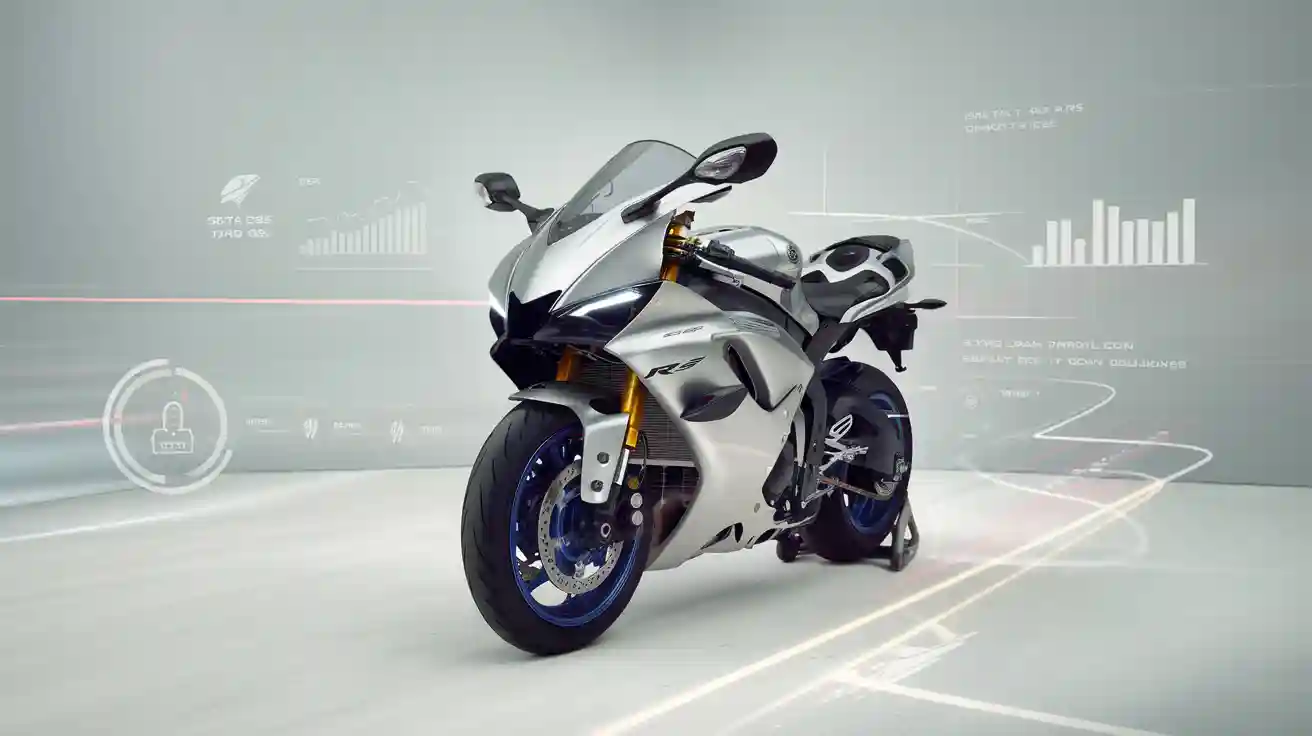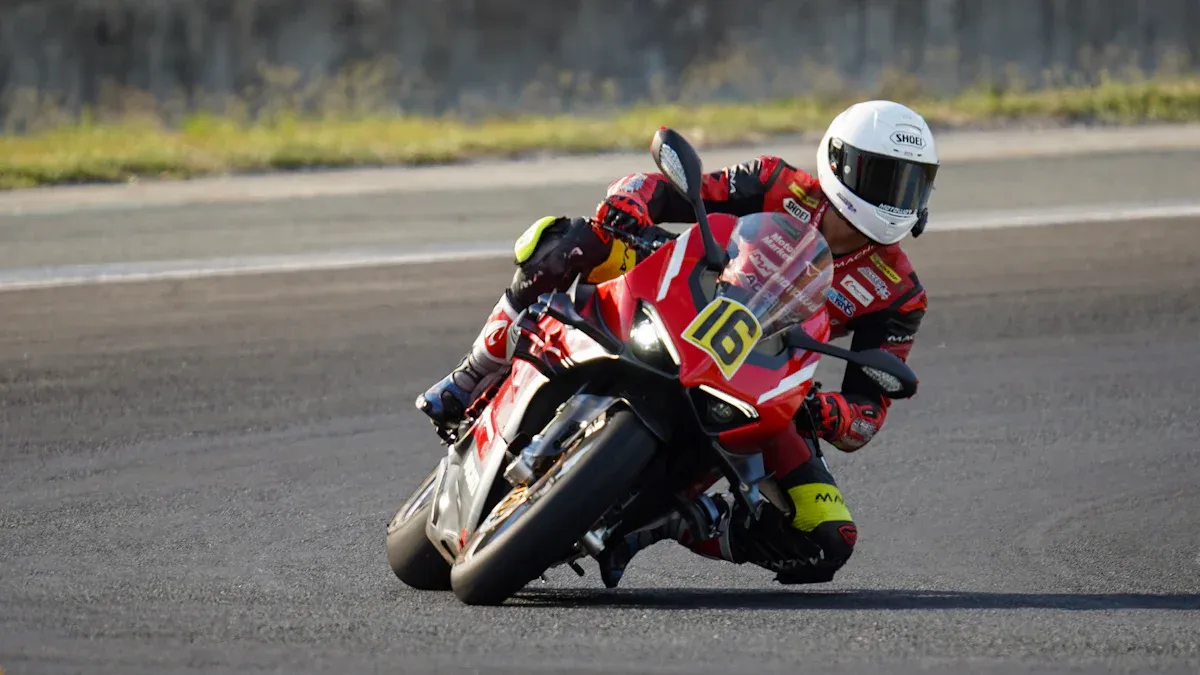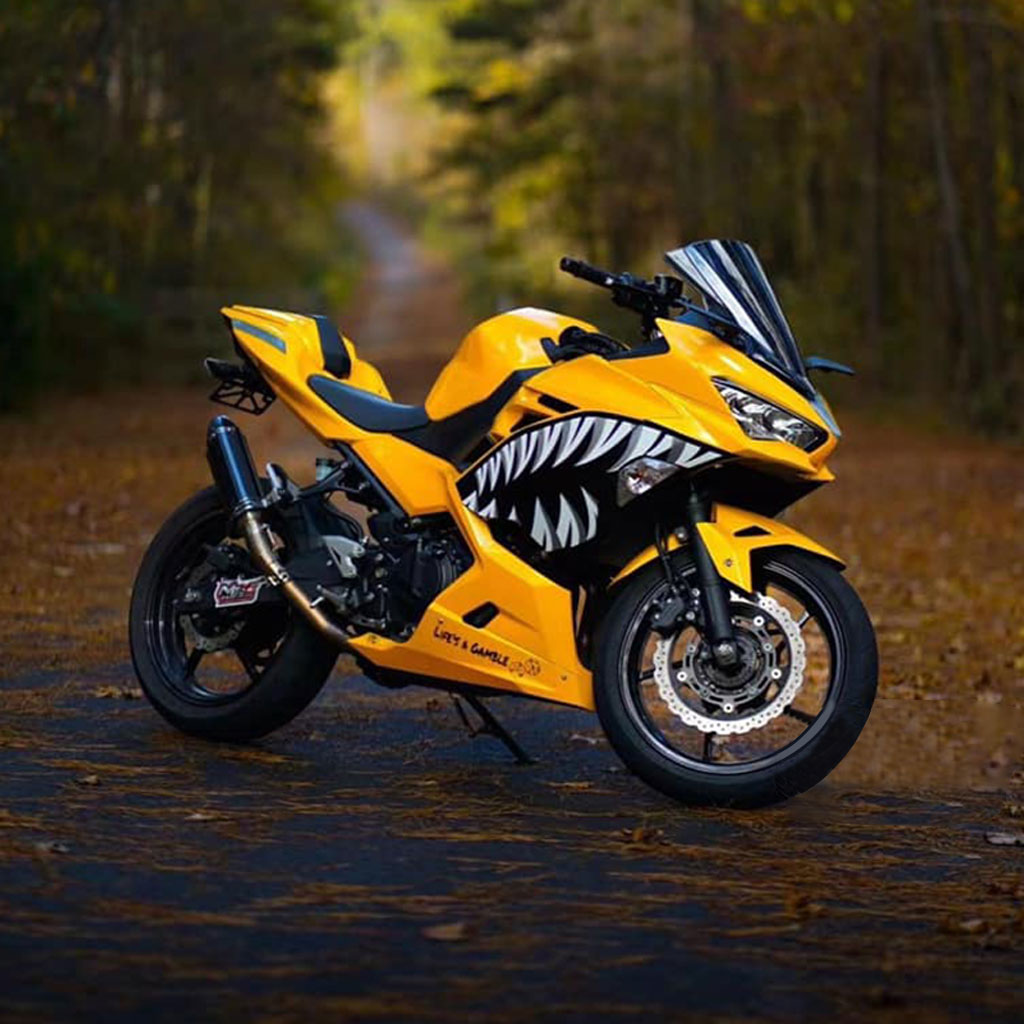R7 Fairings Design Trends and Performance Insights for 2025

Yamaha continues to push boundaries with r7 fairings in 2025. Riders notice lighter, stronger fairings that boost both speed and comfort. Yamaha engineers select advanced materials for these motorcycle fairings, improving durability and reducing weight. New designs help the fairings cut through air, making every ride smoother. Yamaha’s attention to detail ensures motorcycle fairings fit perfectly and last longer. Many riders choose r7 fairings for their performance and style. Yamaha’s innovation in fairings technology sets a new standard for sport bikes.
Materials Innovation in R7 Fairings
Advanced Carbon Fiber Composites
Yamaha leads the industry with advanced carbon fiber composites in its 2025 fairings. Engineers use dry carbon exterior parts, drawing on over a decade of expertise in dry carbon technology. This approach results in lighter and stronger fairings that improve both speed and durability. Yamaha applies 3D scanning and precision manufacturing to ensure every fairing fits perfectly. Riders no longer face issues like warping or misaligned mounting holes. The company offers carbon fiber parts in several weaves, such as plain weave matte and twill weave glossy. Each part receives a UV-cut coating, which protects against sun damage and keeps the fairings looking new.
- Introduction of dry carbon exterior parts using advanced dry carbon technology.
- Use of 3D scanning and precision manufacturing for perfect fitment.
- Carbon fiber parts available in different weaves with UV-cut coatings.
- Machined aluminum dress-up parts complement the carbon components.
- Innovations improve aesthetics, durability, and reduce weight, enhancing aerodynamics and performance.
Laboratory tests show that advanced carbon fiber composites deliver impressive results. The table below highlights key improvements:
| Property | Improvement (%) | Description |
|---|---|---|
| Strength | +40.69 | Experimental validation of strength increase |
| Stiffness | +18.56 | Experimentally measured stiffness increase |
| Mass | -6.1 | Mass reduction demonstrated experimentally |
These results suggest that Yamaha fairings now offer a much better strength-to-weight ratio. Riders benefit from increased reliability and improved handling on the road and track.
Lightweight ABS Plastic and Heat-Shield Technology
Yamaha also uses lightweight ABS plastic in its 2025 fairings. This material provides a balance between strength and flexibility. ABS plastic resists impacts and absorbs vibrations, which helps protect the motorcycle and rider. Yamaha engineers add heat-shield technology to key areas. This feature prevents heat from the engine and exhaust from damaging the fairings or affecting rider comfort. Riders experience cooler surfaces and longer-lasting fairings, even during long rides or high-performance use.
Forged Carbon Fiber and Hybrid Materials
Yamaha continues to innovate by introducing forged carbon fiber and hybrid materials in select fairings. Forged carbon fiber uses short, randomly arranged fibers pressed into shape. This process creates unique patterns and offers high strength with reduced weight. Hybrid materials combine carbon fiber with aluminum or other advanced composites. These combinations deliver the best qualities of each material. Riders enjoy fairings that are both lightweight and tough. Yamaha often pairs forged carbon fiber with machined aluminum accents, creating a modern look and boosting durability. These hybrid designs help Yamaha fairings stand out in both performance and style.
Polyoxymethylene (POM) in Component Construction
Yamaha uses Polyoxymethylene, or POM, in several key components of its R7 fairings. POM is a strong engineering plastic known for its high stiffness and low friction. This material helps Yamaha create parts that move smoothly and last longer. Many fairing brackets, clips, and mounting points now use POM. These parts must handle stress and vibration from the road. POM resists wear and does not crack easily, even after many miles.
Yamaha engineers choose POM because it works well with aluminum and carbon fiber. POM does not corrode or react with metal parts. This makes it ideal for connecting fairings to the motorcycle frame, which often uses aluminum. Riders notice that POM components keep the fairings secure and reduce rattling. The smooth surface of POM also helps during installation and removal. Mechanics can replace or adjust fairings without damaging the mounting points.
Tip: POM parts help Yamaha fairings stay in place, even during high-speed rides or rough conditions.
The use of POM in fairings construction supports Yamaha’s goal of building motorcycles that last longer and perform better. Riders benefit from fewer repairs and a quieter ride. POM’s strength and stability make it a smart choice for modern sport bikes.
Injection Molding and Modern Manufacturing
Yamaha relies on advanced injection molding to produce its R7 fairings. This process starts with ABS plastic, which is melted and injected into a mold. The mold shapes the plastic into precise fairings parts. Constant pressure ensures the material fills every corner and maintains uniform thickness. This method allows Yamaha to create fairings that fit perfectly on every motorcycle.
Modern injection molding gives Yamaha a big advantage in quality and consistency. Each fairing comes out of the mold with the same shape and size. Riders get fairings that match the original design every time. Monster Fairings, a leading manufacturer, notes that injection molding produces stronger and more reliable fairings than older methods like compression molding. Problems such as uneven surfaces or extra material, called flashing, rarely occur with this technology.
Yamaha combines injection-molded ABS plastic with aluminum and carbon fiber elements. This mix of materials creates fairings that are light, strong, and stylish. Aluminum brackets and supports add strength where needed. The result is a set of fairings that improve both performance and appearance.
- Benefits of Injection Molding for Yamaha R7 Fairings:
- Precise fit and finish
- Consistent quality across all parts
- Reduced risk of defects or weak spots
- Easy integration with aluminum and carbon fiber components
Yamaha’s use of modern manufacturing methods ensures that every R7 fairing meets high standards. Riders enjoy better aerodynamics, less weight, and a sleek look. The combination of injection molding and advanced materials keeps Yamaha at the front of motorcycle design.
2025 Motorcycle Fairings Design Trends
Aerodynamic Styling and Winglet Integration
Manufacturers in 2025 focus on aerodynamic styling to improve both speed and stability. Many motorcycle fairings now feature winglets, which help direct airflow and increase downforce. These additions keep the bike steady at high speeds and reduce wind resistance. Designers use lightweight materials like carbon fiber and advanced composites to shape these features. This approach not only boosts performance but also helps meet strict emission rules by improving fuel efficiency. European markets often lead with sleek, aerodynamic fairings, while other regions adapt these trends to local preferences.
Note: Winglet integration is not just for racing. Everyday riders benefit from better handling and less fatigue during long rides.
Minimalist and Aggressive Lines
The trend toward minimalist and aggressive lines continues to grow. Many fairings now have sharp angles and bold shapes. This style gives motorcycles a modern, powerful look. Riders see fewer bulky parts and more streamlined surfaces. Manufacturers use advanced manufacturing methods, such as 3D printing, to create these precise shapes. This technology allows for rapid prototyping and customization, reducing waste by up to 90% compared to older methods. Regional preferences also play a role. North American riders often choose bulkier, customizable fairings, while Asian markets prefer practical, vibrant designs for city use.
Custom Finishes, Paintwork, and UV Protection
Custom finishes and paintwork set 2025 motorcycle fairings apart. Riders can choose from a wide range of colors and patterns. Many companies offer UV protection coatings, which keep the paint looking fresh and prevent fading. Sustainable materials, such as bio-composites and recycled plastics, are becoming more common. These eco-friendly options reduce environmental impact and support recycling programs. About 42% of riders now prefer motorcycles made with sustainable materials. Manufacturers respond by offering fairings that combine style, durability, and environmental responsibility.
- Key trends in 2025 motorcycle fairings:
- Use of eco-friendly materials and recycling initiatives
- Lightweight construction for better aerodynamics
- Customization through advanced manufacturing
- Regional designs that match local tastes
Integrated Functional Features for Performance
Riders in 2025 expect more than just style from their motorcycle fairings. Yamaha delivers by integrating advanced features that directly impact performance and rider experience. Engineers design these fairings to work with the latest technology, making every ride safer and more enjoyable.
Many new fairings include aerodynamic winglets. These winglets create real downforce at speed, which improves front-end grip and stability. Riders notice better control, especially during fast cornering or sudden maneuvers. The aerodynamic cowling and twin-eye face design also help reduce the frontal area, making the motorcycle fairings more efficient against wind resistance.
Yamaha equips the R7 with adaptive bi-functional LED headlights. These lights improve visibility in all conditions and add to the aggressive look of the fairings. Removable mirrors allow for quick changes between street and track setups. Riders can remove the mirrors without leaving exposed hardware, which keeps the fairings clean and ready for racing.
The 6-axis IMU electronics package stands out as a major upgrade. This system manages traction, slide, and wheelie control, along with ABS. Riders can adjust these settings for different road or track conditions. The Y-TRAC app integration lets riders review detailed ride data, such as lean angle and brake pressure, to improve their skills and optimize settings.
Suspension improvements also play a key role. The KYB separate function fork and updated rear shock respond better to rough surfaces. This gives riders more confidence and keeps the tires in contact with the road. Radial-mount front brake calipers and an Assist & Slipper clutch provide smoother gear shifts and stronger braking.
Note: These integrated features make the 2025 R7 fairings a top choice for riders who want both performance and comfort.
Performance Benefits of R7 Fairings

Enhanced Aerodynamics and Reduced Wind Drag
Yamaha engineers design the latest fairings to cut through the air with less resistance. The 2025 models feature sharper lines and integrated winglets that help direct airflow around the motorcycle. This design reduces wind drag and keeps the bike stable at high speeds. Riders notice less buffeting, especially during highway rides or track sessions. The improved aerodynamics also help the engine work more efficiently, which can lead to better fuel economy. Many riders report that the new fairings make the motorcycle feel smoother and more predictable, even in windy conditions.
Improved aerodynamics not only boost speed but also increase rider confidence during fast cornering.
Weight Reduction and Improved Handling
Yamaha focuses on reducing weight across all components, including the fairings. Lighter materials such as carbon fiber and advanced plastics help lower the overall mass of the motorcycle. This weight reduction makes the bike easier to handle and more responsive to rider input. The table below shows how weight savings in different parts contribute to better handling:
| Component | Weight Reduction | Impact on Handling Description |
|---|---|---|
| Gale Speed Aluminum Forged Wheels | Front: 1.03 kg lighter | Improved bike balance; makes the bike feel smaller; better response when changing direction from braking; enhanced cornering confidence |
| Rear: 2.7 kg lighter | ||
| Akrapovic JMCA Racing Line Exhaust | 0.7 kg lighter | Engine response improved; easier throttle opening; snappy sound that enhances rider's engagement |
| 2025 R7 Fairings | Not explicitly stated | No explicit weight reduction data provided |
| Handling Impact Quantification | N/A | Suggested use of QSTARZ GPS Lap Timer LT-8000GT to quantify handling improvements, but no specific data given |
Although the exact weight reduction for the 2025 R7 fairings is not specified, riders still experience a noticeable improvement in agility. The lighter construction allows for quicker changes in direction and better control during braking. Yamaha’s commitment to lightweight design helps unlock the full performance potential of the motorcycle.
Increased Durability and Longevity
Yamaha uses advanced materials to make fairings that last longer and resist damage. Carbon fiber and ABS plastic provide strength without adding unnecessary weight. These materials protect the motorcycle from scratches, impacts, and heat. Riders benefit from fairings that keep their shape and color, even after years of use. The UV-resistant coatings prevent fading, so the bike looks new for longer. Yamaha tests each fairing for durability in real-world conditions. This attention to quality means fewer repairs and lower maintenance costs over time.
Riders who invest in high-quality fairings enjoy peace of mind, knowing their motorcycle will stay protected and stylish for many seasons.
Improved Rider Comfort and Wind Protection
Yamaha engineers design the 2025 fairings to maximize rider comfort. The new shapes channel air away from the rider’s chest and helmet. This design reduces wind fatigue during long rides. Riders experience less buffeting, which means they can maintain focus and control. The fairings also help keep rain and debris off the rider, making every journey safer and more pleasant.
Many riders notice the difference in comfort when they switch to the latest r7 fairings. The windscreen sits at an optimized angle. It directs airflow over the helmet, reducing noise and pressure. Riders who spend hours on the road appreciate this feature. The fairings also include subtle contours that guide air around the legs and arms. This helps maintain a stable temperature and prevents cold spots.
Tip: Riders who want the best wind protection should adjust the windscreen height to match their riding position.
A table below highlights key comfort improvements:
| Feature | Rider Benefit |
|---|---|
| Optimized windscreen | Less wind noise and fatigue |
| Aerodynamic contours | Stable airflow, fewer cold spots |
| Extended side panels | Better rain and debris protection |
These changes make the 2025 models a top choice for riders who value comfort as much as speed.
Better Heat Management and Noise Reduction
Heat management stands out as a major focus in the latest fairing designs. Yamaha uses advanced materials that resist heat and shield the rider from engine warmth. The fairings include built-in vents that direct hot air away from the cockpit. This keeps the rider cool, even in heavy traffic or on hot days. The heat-shield technology also protects the fairings from warping or discoloration.
Noise reduction plays a key role in the new models. The fairings use layered construction to absorb vibrations and block engine noise. Riders enjoy a quieter ride, which helps reduce fatigue and improves concentration. The combination of heat management and noise control leads to a more enjoyable experience on every trip.
- Key benefits of improved heat and noise control:
- Cooler surfaces for the rider
- Less engine and wind noise
- Longer-lasting fairing materials
Yamaha’s focus on these features shows a commitment to both rider well-being and overall performance. Riders who choose the 2025 models gain a clear advantage in comfort and control.
Component-Specific Innovations in R7 Fairings
Tank Covers and Their Impact
Tank covers on the 2025 Yamaha R7 showcase major advancements in both materials and design. The SIXFIBER tank cover uses a revolutionary material that weighs about 40% less than aviofiber and 60% less than traditional fiberglass. This weight reduction helps improve the motorcycle’s overall agility and handling. The material’s flexibility allows the tank cover to fit closely to the bike’s frame, making installation easier and improving rider comfort. Riders benefit from a tank cover that adapts to the motorcycle’s structure, which can enhance ergonomics during long rides. The cover’s impact resistance and flexibility also help protect the tank from damage, maintaining its shape and strength better than older fiberglass options. The fuel capacity remains at 3.4 gallons, so riders do not lose range with the new design.
- Lighter material for better handling
- Flexible fit for improved ergonomics
- Strong impact resistance for durability
- No change in fuel capacity
Front and Rear Fenders for Aerodynamics
Front and rear fenders on the latest R7 models play a key role in managing airflow. Designers shape these fenders to reduce wind drag and direct air smoothly around the wheels. This approach helps keep the motorcycle stable at high speeds and improves cornering performance. The use of high-quality cast aluminum parts in the mounting brackets adds strength without extra weight. Riders notice better grip and less turbulence, especially when riding in windy conditions or on the track. The aerodynamic fenders also help keep debris away from the tires, which can extend tire life and improve safety.
Tip: Aerodynamic fenders can make a noticeable difference in both speed and stability, especially for riders who enjoy spirited riding.
Under Cowls for Heat and Debris Protection
Under cowls on the 2025 R7 serve two important functions. First, they shield the engine and lower frame from road debris, rocks, and water. Second, they help manage heat by directing hot air away from sensitive components. Engineers use lightweight materials that resist heat and maintain their shape under stress. The under cowl’s design works together with forged aluminum pistons in the engine, helping to keep temperatures stable during intense riding. Riders benefit from a cleaner engine area and more consistent performance, even in demanding conditions.
A table below highlights the main benefits of these innovations:
| Component | Main Benefit |
|---|---|
| Tank Cover | Weight reduction, ergonomics |
| Fenders | Aerodynamics, stability |
| Under Cowl | Heat and debris protection |
Side Panels and Tail Sections for Stability
Side panels and tail sections on the 2025 Yamaha R7 play a critical role in motorcycle stability. Engineers design these components to manage airflow and reduce turbulence. The side panels use sculpted shapes that guide air smoothly along the bike’s body. This design helps keep the motorcycle steady, especially at high speeds. Riders notice less wobble and more control during fast cornering.
The tail section also contributes to stability. It features a raised profile and sharp edges. These elements help direct air away from the rear wheel. The result is improved traction and less lift at the back of the bike. Riders experience better grip and more predictable handling, even when accelerating hard out of turns.
Yamaha uses advanced materials for these parts. Many side panels and tail sections now include carbon fiber and high-quality cast aluminum parts. These materials keep the weight low while adding strength. The lightweight construction allows for quick direction changes and responsive steering. Riders benefit from a motorcycle that feels agile and stable at the same time.
Tip: Riders who want the best performance should check that all side panels and tail sections fit tightly. Loose parts can create drag and reduce stability.
A table below highlights the main benefits of these innovations:
| Component | Stability Benefit |
|---|---|
| Side Panels | Smoother airflow, less wobble |
| Tail Section | Better rear grip, less lift |
| Material Choice | Lower weight, more strength |
Yamaha’s focus on stability extends to the smallest details. The mounting points use forged aluminum pistons for extra durability. This approach ensures that the panels stay secure, even during aggressive riding. Riders can trust their R7 to deliver a stable and confident ride in any condition.
Choosing the Right R7 Fairing Upgrade
Matching Materials to Riding Style and Needs
Riders should consider their typical riding conditions before selecting new R7 fairings. Those who ride on the track may prefer carbon fiber fairings. These offer the best weight savings and strength. Commuters or city riders often choose ABS plastic fairings. This material provides flexibility and resists daily wear. Hybrid options, which combine carbon fiber with aluminum, suit those who want both durability and a modern look. Riders who value easy installation and long-term reliability should look for fairings with POM mounting points. These parts help keep the fairings secure during high-speed rides.
Tip: Riders who often push their bikes to the limit should consider fairings that use forged aluminum pistons for extra durability.
Balancing Style, Function, and Budget
Selecting the right fairing upgrade involves more than just performance. Riders must balance style, function, and cost. Custom finishes and paintwork allow for personal expression. Some riders choose matte or glossy finishes to match their bike’s theme. Others focus on aerodynamic features that improve handling. Budget-conscious riders can find high-quality cast aluminum parts that offer strength without a high price tag. Comparing different brands and materials helps riders find the best value for their needs.
A simple table can help compare priorities:
| Priority | Best Material Choice |
|---|---|
| Lightweight | Carbon Fiber |
| Durability | Hybrid/Aluminum |
| Affordability | ABS Plastic/Aluminum Parts |
| Custom Style | Painted/UV-Protected Finish |
Installation, Compatibility, and Maintenance Tips
Proper installation ensures that fairings perform as designed. Riders should check compatibility with their specific R7 model year. Many modern fairings use modular designs for easier fitting. Reading the manufacturer’s instructions helps avoid mistakes. Regular maintenance keeps fairings looking new. Cleaning with mild soap and water prevents scratches. Riders should inspect mounting points for wear, especially after long rides. Replacing worn hardware, such as forged aluminum pistons, maintains safety and stability.
Note: Choosing fairings with high-quality cast aluminum parts can reduce the risk of damage during installation and use.
The 2025 r7 fairings set a new standard in motorcycle design. Riders gain lighter, stronger, and more aerodynamic fairings that improve every ride. These upgrades boost comfort and performance for both daily commutes and track days. Each rider should think about their style, goals, and maintenance needs before choosing the best upgrade.
Tip: Careful selection ensures the right balance of performance and durability.
FAQ
What makes 2025 R7 fairings different from previous models?
The 2025 R7 fairings use advanced materials and improved designs. Engineers focus on aerodynamics, weight reduction, and rider comfort. These updates help riders experience better handling and increased durability compared to older models.
Are the new fairings compatible with older R7 models?
Most 2025 R7 fairings fit recent R7 models. Riders should check compatibility before purchasing. Some parts, like high-quality cast aluminum parts, may require specific mounting points or hardware for proper installation.
How do forged aluminum pistons improve fairing performance?
Forged aluminum pistons provide strong and lightweight mounting points for fairings. They help keep panels secure during high-speed rides. This technology also reduces vibration and increases the overall stability of the motorcycle.
Can riders install the fairings themselves?
Many riders can install R7 fairings at home using basic tools. Manufacturers include clear instructions. For best results, riders should follow the guide and check all fasteners, especially when working with high-quality cast aluminum parts.
What maintenance do R7 fairings require?
Riders should clean fairings with mild soap and water. Regularly inspect mounting points and hardware, including forged aluminum pistons, for signs of wear. Proper care helps maintain appearance and ensures long-lasting performance.
See Also
Advantages And Disadvantages Of Custom Ducati Panigale Fairings
Best Five Motorcycle Aftermarket Fairing Brands To Watch In 2025
Best Fairing Options For Honda CBR650R Riders From 2019 To 2023
Nicefairings Offers Custom Motorcycle Fairings With Distinctive Designs
Yamaha R6 Fairing Kits Compared For Style And Enhanced Performance

